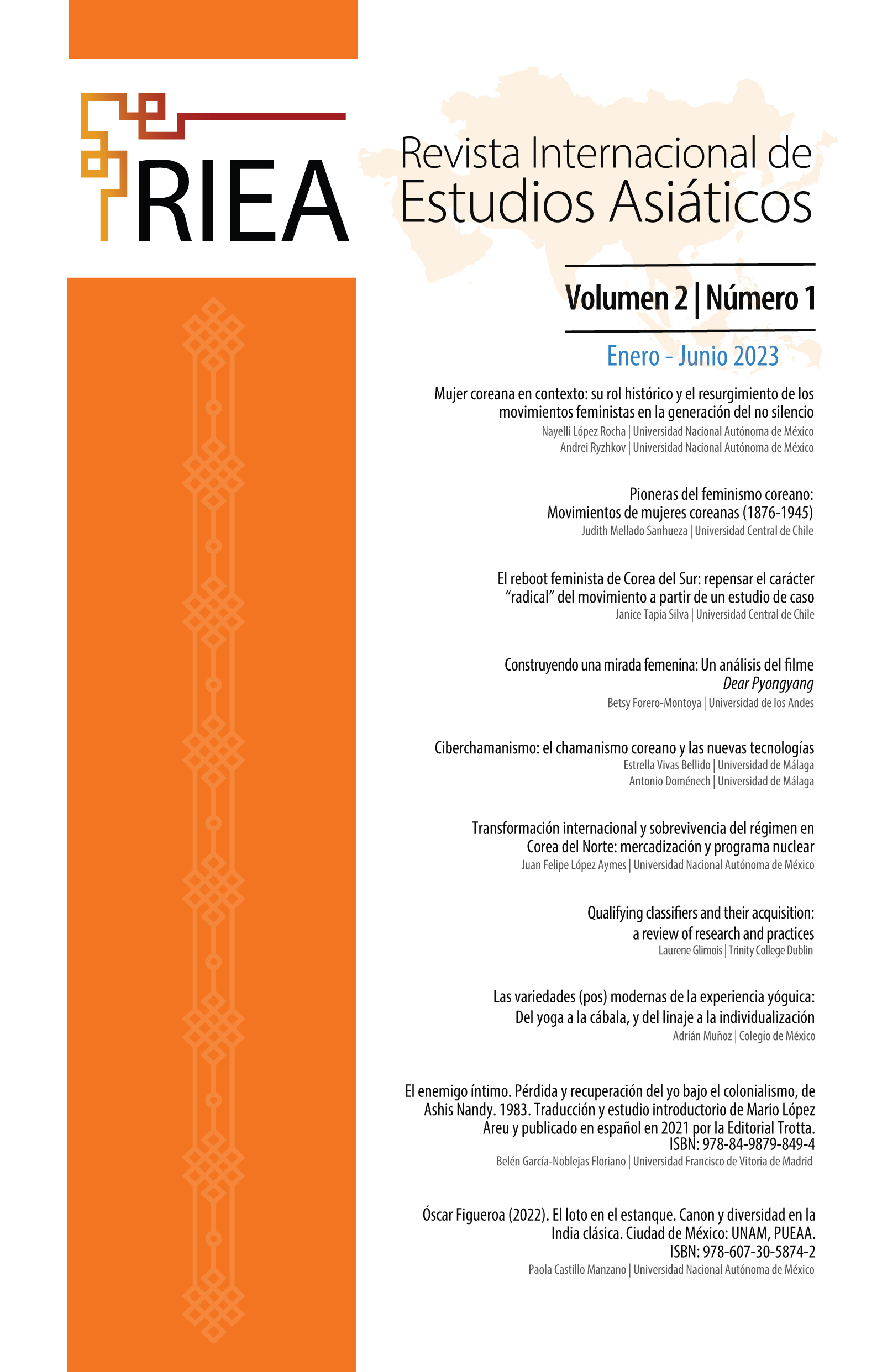Abstract
Based on the gaze theory that promoted a feminist turn in the analytical approach and production of cinema since the end of the 20th century, this article proposes to study the film Dear Pyongyang (2005), directed by Yang Yong-hi. It develops the construction of the concept of female gaze while it looks at how the film builds a narrative that exceeds the limits of a patriarchal order. The article starts from two aspects. The first one refers to the essay film as a genre, in first person, which makes it possible to focus on non-normative figures. The second one is the displacement of the male gaze sexual pleasure in order to understand a pleasure motivated by human narratives beyond binary categories of gender and ethnicity. In this manner, the analysis accomplishes its last purpose. It is to make us audiences concentrate on the work of a female director who has both subverted and nourished the corpus of alternative filmography made by women, according to her socio-historical context
References
Bell, Markus. “Going ʺhomeʺ: why 87,000 Zainichi Koreans moved from Japan to North Korea”. NK News. Accedido el 7 de julio de 2022. https://www.nknews.org/2020/02/going-home-why-87000-zainichi-koreans-moved-from-japan-to-north-korea/
Bingman, Adam.“Modern Japanese Female Directors”. En Contemporary Japanese Cinema since Hanabi. Edinburgo: Edinburg University Press, 2015.
Byung-Chae, Min. “The Evolving Zainichi Community and Multicultural Society in Japan”, The Yale Review of International Studies, (junio de 2020), http://yris.yira.org/comments/4092.
Chapman, David. “The third way and beyond: Zainichi Korean identity and the politics of belonging”, Japanese Studies 24, no. 1 (2004): 29-44.
Chapman, David. Zainichi Korean identity and ethnicity. London: Routledge, 2009.
De Lauretis, Teresa. Alice Doesn’t: Feminism, Semiotics, Cinema. Londres: Macmillan, 1984.
Dew, Oliver. Zainichi Cinema: Korean-In-Japan Film Culture. Cham: Palgrave Macmillan, 2016.
Forero-Montoya, Betsy. Foreign Otherness in Japanese Media Japón: Exploring the Japanese Self through the Images of Japanese Media. Bogotá: Ediciones Uniandes, 2021.
French, Lisa. “Women and Documentary”. En The Female Gaze in Documentary Film: An International Perspective. Cham: Palgrave Macmillan, 2021.
Hawon, Jang. «The Special Permanent Residents in Japan: Zainichi Korean». The Yale Review of International Studies, (enero de 2019). http://yris.yira.org/comments/2873.
Ince, Kate. The Body and the Screen: Female Subjectivities in Contemporary Women’s Cinema: Thinking Cinema. Londres: Bloomsbury Academic, 2017.
Lie, John. «Zainichi: The Korean Diaspora in Japan” », Education About Asia: Online Archives 14, n. 2 (otoño de 2009):16-21. https://www.asianstudies.org/publications/eaa/archives/zainichi-the-korean-diaspora-in-japan/
Lie, John. Zainichi (Koreans in Japan): Diasporic Nationalism and Postcolonial Identity. Berkeley: University of California Press, 2008.
Mindan. “Presentación de la Unión, estadísticas”. Accedido el 20 de julio de 2022. https://www.mindan.org/old/shokai/toukei.html
Mínguez, Norberto y Manzano Espinosa Cristina. “El ensayo en el audiovisual español contemporáneo: definición, producción y tendencias”. Communication & Society 33, no.3 (2020):17-32.
Mulvey, Laura. “Afterthoughts on ‘Visual Pleasure and Narrative Cinema’ inspired by King Vidor’s Duel in the Sun (1946)”. En Visual and Other Pleasures. Language, Discourse, Society. Londres: Palgrave Macmillan, 1989.
Mulvey, Laura. “Visual Pleasure and Narrative Cinema”. 1975.
Ryang, Sonia. “Space and Time: The Experience Of The "Zainichi", The Ethnic Korean Population of Japan”. Urban Anthropology and Studies of Cultural Systems and World Economic Development 43, no. 4, (2014): 519-550.
Sang, Tze-lan Deborah. “The many ways of speaking as ‘I’: Wuna Wu’s first-person documentaries from Taiwan”. Studies in Documentary Film 14, no.1 (2020): 63-80.
Silverman, Kaja. The Acoustic Mirror: The Female Voice in Psychoanalysis and Cinema: Theories of Representation and Difference. Bloomington e Indianapolis: Indiana University Press, 1988.
Yu K.T. y Lebow A. “Feminist approaches in women’s first person, documentaries from East Asia”. Studies in Documentary Film 14, no.1 (2020):1-6.

